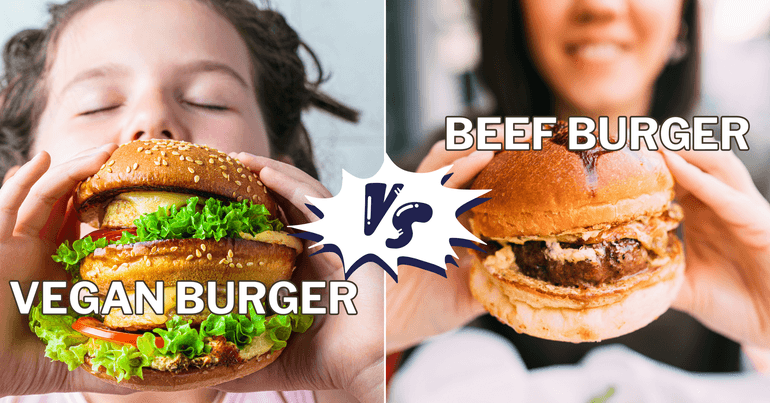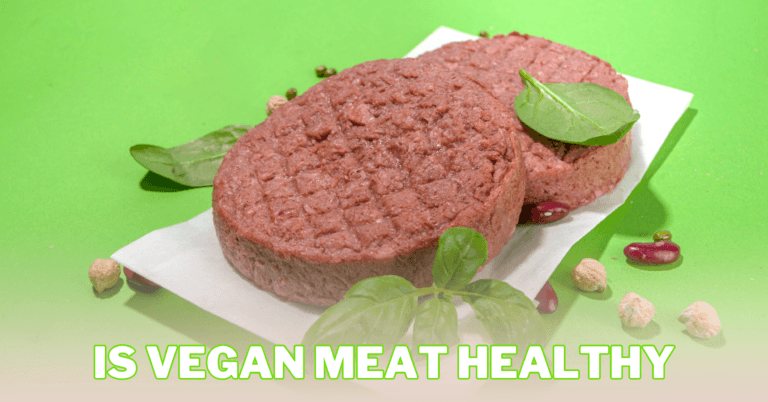Vegan Burger vs Beef Burger
Vegan Burger vs Beef Burger
In a world where dietary choices are becoming more diverse and conscious, the clash between tradition and innovation is ever-present on our plates.
The debate between a classic beef burger and its contemporary counterpart, the vegan burger, is emblematic of this culinary evolution.
As consumers increasingly seek healthier and more environmentally friendly options, comparing these two iconic burgers delves beyond taste preferences, touching upon nutrition, sustainability, and ethical considerations.
Join us as we dissect the qualities, benefits, and drawbacks, exploring the nuanced landscape of the vegan burger versus the beef burger.

What Is A Vegan Burger?
A vegan burger is a plant-based alternative to the traditional beef burger, crafted entirely from non-animal ingredients. It represents a culinary innovation that caters to a growing population seeking sustainable and ethical dietary choices.
The foundation of a vegan burger often revolves around plant-based proteins like legumes (such as black beans, lentils, and chickpeas), tofu, tempeh, seitan, or grains like quinoa.
These ingredients are combined with a mix of vegetables, seasonings, and binders like flaxseeds or breadcrumbs to create a patty that mirrors the texture and taste of a meat burger.
Vegan burgers are not merely a substitution; they have evolved into a realm of gastronomic creativity, offering diverse flavours, from classic “beefy” to innovative gourmet profiles.
Many brands and restaurants experiment with various plant-derived ingredients, utilizing techniques like marinating, seasoning, and grilling to achieve an authentic taste and feel.
The rise of veganism and plant-forward diets has spurred the development of advanced cooking methods and processing techniques, allowing vegan burgers to closely replicate the juiciness, tenderness, and satisfying experience associated with traditional meat burgers.
Beyond taste, the allure of vegan burgers lies in their alignment with health-conscious and environmentally aware lifestyles.
These burgers are typically lower in saturated fats and cholesterol while rich in dietary fiber, vitamins, minerals, and antioxidants derived from plant-based ingredients.
Furthermore, vegan burgers significantly reduce the environmental footprint associated with meat production, reducing greenhouse gas emissions, water usage, and land degradation.
As a versatile and delectable option, the vegan burger symbolizes the culinary shift toward a more compassionate and sustainable future.

What Is A Beef Burger?
A beef burger, often called a hamburger, is a quintessential American fast-food classic and a widely popular dish worldwide.
A beef burger consists of a ground beef patty seasoned with various spices and typically cooked on a grill, stovetop, or barbecue.
The patty is placed in a sliced bun and adorned with various toppings and condiments, from lettuce, tomato, and onion to cheese, bacon, and special sauces.
The taste and texture of a beef burger are distinctively characterized by the rich and savoury flavour of cooked beef, often accompanied by a juicy and tender mouthfeel.
The fat content in ground beef contributes to the burger's juiciness and depth of flavour when cooked.
The Maillard reaction, a chemical reaction during cooking, gives the beef patty its signature browned crust and umami-rich taste, enhancing its overall appeal.
Beef burgers come in many styles and preparations, reflecting diverse regional and cultural preferences.
From the classic American cheeseburger to gourmet variations with premium toppings, the beef burger has become a canvas for culinary creativity and indulgence.
However, it's important to note that beef burgers are also associated with higher levels of saturated fats and cholesterol linked to health concerns such as heart disease.
While beloved for its nostalgic and comforting qualities, the beef burger has also faced criticism for its environmental impact.
The meat sector has a major impact on water use, deforestation, and greenhouse gas emissions.
As a result, alternative burger options, such as plant-based vegan burgers, have gained popularity as consumers seek more sustainable and ethical choices that align with their health and environmental values.

Health Benefits Of Vegan Burgers
Vegan burgers have gained significant popularity as a nutritious and environmentally conscious alternative to traditional beef burgers.
Packed with plant-based ingredients, these burgers offer various health benefits contributing to overall well-being. Let's delve into the comprehensive details of these benefits:
1. Heart Health
One of the standout advantages of vegan burgers is their positive impact on heart health. Unlike beef burgers, which are often high in saturated fats and cholesterol, vegan burgers rely on ingredients like legumes, grains, vegetables, and plant-based oils.
These components are lower in saturated fat and cholesterol-free, promoting cardiovascular health and reducing the risk of heart disease.
Including heart-healthy fats like those from avocados, nuts, and olive oil further supports optimal heart function.
2. Weight Management
For individuals looking to manage their weight, vegan burgers can be a valuable addition to their diet.
These burgers are generally lower in calories than beef burgers, thanks to their reliance on nutrient-dense plant ingredients.
The fiber content from beans, lentils, whole grains, and vegetables aids in satiety, helping you feel full for longer and reducing the likelihood of overeating.
Furthermore, avoiding high-calorie animal fats in vegan burgers supports weight control efforts.
3. Digestive Health
The abundance of dietary fibre in vegan burgers is a boon for digestive health. Fibre-rich ingredients like beans, lentils, and whole grains promote regular bowel movements, prevent constipation, and support a balanced gut microbiome.
A healthy gut microbiome is associated with improved digestion, nutrient absorption, and mental well-being. By incorporating vegan burgers into your diet, you're supporting your gastrointestinal system's optimal function.
4. Reduced Cancer Risk
Vegan burgers often feature an array of colourful vegetables and legumes, which are rich sources of antioxidants.
Antioxidants play a key role in the body's defence against dangerous free radicals that may otherwise cause cellular damage and raise the risk of chronic illnesses like cancer.
By consuming a diet abundant in plant-based foods like vegan burgers, you're actively contributing to reducing your risk of certain types of cancer.
5. Blood Sugar Control
The complex carbohydrates present in vegan burger ingredients, such as beans and whole grains, have a gentle impact on blood sugar levels.
These complex carbohydrates, as opposed to the refined carbohydrates in beef burgers, release glucose into the bloodstream gradually, minimizing sudden spikes and dips in blood sugar.
People with diabetes or those trying to maintain their blood sugar levels will benefit most from this consistent blood sugar control.
6. Nutrient Diversity
Vegan burgers are a treasure trove of essential nutrients. Incorporating diverse plant-based ingredients ensures you receive a wide spectrum of vitamins, minerals, and antioxidants.
Ingredients like beans provide plant-based protein, iron, and B vitamins, while vegetables supply vitamins A and C, folate, and potassium.
This nutrient diversity supports overall health, boosts immune function, and contributes to your vitality.
7. Inflammation Reduction
Vegan burgers contain plant nutrients and are anti-inflammatory. Heart disease, diabetes, and autoimmune disorders are among the health problems associated with chronic inflammation.
Opting for vegan burgers and other plant-based foods can help mitigate inflammation, supporting your body's defence against chronic diseases.
8. Environmental Impact
Choosing vegan burgers aligns with environmentally sustainable choices. Plant-based diets have a significantly lower carbon footprint than those centred around animal products.
By adopting a diet rich in vegan burgers, you contribute to reduced greenhouse gas emissions, deforestation, and water usage. This benefits your health and supports efforts to address environmental challenges.
9. Allergen Avoidance
Vegan burgers provide a safe option for individuals with allergies or sensitivities. By eliminating common allergens like dairy and eggs, vegan burgers offer a nutritious and allergen-free alternative.
The plant-based ingredients in these burgers can be enjoyed without concern for adverse allergic reactions.
10. Ethical Considerations
Beyond their health advantages, vegan burgers align with ethical values. Opting for plant-based alternatives reflects a compassionate choice that contributes to animal welfare.
By choosing vegan burgers, you support the reduction of animal suffering and promote more humane and sustainable food practices.

Health Benefits Of Beef Burgers
Beef burgers have long been a staple of diets worldwide, offering a substantial source of protein and a hearty flavour.
While they are often enjoyed for their taste, it's important to consider the health benefits and potential drawbacks of consuming beef burgers. Let's explore the comprehensive details of the health benefits of beef burgers:
1. High-Quality Protein
Beef burgers are rich in high-quality protein, essential for the growth, repair, and maintenance of body tissues.
Amino acids, the building blocks of muscles, enzymes, hormones, and immune system components, are all found in protein.
Incorporating beef burgers into your diet can help meet your protein needs and support various bodily functions.
2. Complete Amino Acid Profile
Since it contains all essential amino acids in the precise proportions the body needs, beef is regarded as a complete protein source.
People looking to increase and maintain their muscular mass and promote general health will find this especially helpful.
3. Iron Content
Heme iron, which is easier for the body to absorb than non-heme iron in plant-based meals, is a significant component of beef.
The movement of oxygen, the generation of energy, and general life all depend on iron. Eating beef burgers can help prevent iron deficiency anemia, especially for people who need more iron.
4. Vitamin B12
Beef burgers are a rich source of vitamin B12, a nutrient primarily found in animal products. Vitamin B12 is essential for nerve function, DNA synthesis, and the formation of red blood cells.
Regular consumption of beef burgers can contribute to meeting your vitamin B12 needs, especially for individuals following diets with limited animal products.
5. Zinc Content
Beef is a significant source of zinc, a mineral essential for immune function, wound healing, and maintaining healthy skin.
Adequate zinc intake is crucial for various physiological processes, making beef burgers a valuable dietary source of this nutrient.
6. Satiety And Fullness
The protein and fat content in beef burgers can promote feelings of satiety and fullness, reducing the likelihood of overeating.
Including protein-rich foods in your meals, such as beef burgers, can help you manage your appetite and support weight management goals.
7. Vitamins B
Beef contains a range of B vitamins, including niacin (B3), riboflavin (B2), and pantothenic acid (B5).
These vitamins are essential for energy metabolism, skin health, and the nervous system. Consuming beef burgers can contribute to your daily intake of these important nutrients.
8. Creatine
Beef is a natural source of creatine, which provides energy for short bursts of intense physical activity.
Athletes and individuals engaged in strength training may benefit from the natural creatine content in beef burgers to enhance exercise performance.
9. Omega-3 Fatty Acids
While not as rich as fatty fish, certain cuts of beef, such as grass-fed varieties, can contain small amounts of omega-3 fatty acids.
Omega-3 fatty acids are known to be anti-inflammatory and have potential cardiovascular advantages.
10. Taste And Satisfaction
A beef burger's savoury taste and satisfying feeling can create an enjoyable eating experience.
Pleasure and satisfaction in meals can positively impact overall well-being and promote a healthy relationship with food.
It's important to note that while beef burgers offer several health benefits, they also come with considerations.
Beef frequently contains higher cholesterol and saturated fat levels, which may increase the risk of cardiovascular disease.
Additionally, the environmental impact of beef production and ethical considerations related to animal welfare should be considered when making dietary choices.

Side Effects Of Vegan Burgers
Vegan burgers, plant-based alternatives to traditional meat burgers, are generally healthier for many individuals.
However, like any food product, they may have potential side effects or considerations to be aware of. Here are some points to keep in mind:
1. Digestive Distress
Vegan burgers often contain various plant-based ingredients, such as beans, legumes, and vegetables, that can be high in fibre.
While fibre benefits digestive health, consuming it quickly may lead to bloating, gas, or gastrointestinal discomfort for some individuals, especially those not accustomed to a high-fibre diet.
2. Soy Sensitivity
Some vegan burgers use soy-based proteins, such as tofu or tempeh, as a primary ingredient. While soy is a rich source of plant-based protein, it can trigger allergies or sensitivities in some individuals. Those with soy allergies or intolerances should carefully read ingredient labels or opt for soy-free alternatives.
3. Allergic Reactions
Vegan burgers often blend plant-based ingredients, such as nuts, seeds, and gluten-containing grains. Individuals with allergies to these ingredients should be cautious when consuming vegan burgers and ensure they are aware of the specific ingredients used in the product.
4. Processed Ingredients
Certain vegan burgers may contain processed or highly refined ingredients, including additives, preservatives, and flavour enhancers.
While these components are generally recognized as safe for consumption, individuals who prefer minimally processed foods may want to choose vegan burger options with simpler ingredient lists.
5. Caloric Intake
While vegan burgers are often lower in calories than meat, the overall calorie content can vary depending on the brand and preparation method.
Overconsumption of vegan burgers, especially with high-calorie toppings and sides, can contribute to excessive calorie intake and potentially hinder weight management goals.

Side Effects Of Beef Burgers
Beef burgers, made from ground beef, are a popular and delicious food choice for many.
However, some potential side effects and health considerations are associated with consuming beef burgers, particularly when consumed in excess or as part of an imbalanced diet. Here are some points to be aware of:
1. High Saturated Fat And Cholesterol
Beef burgers are often high in saturated fat and cholesterol, especially if made from fatty cuts of beef or with added cheese and sauces.
Diets rich in saturated fats and cholesterol have been linked to an increased risk of heart disease and elevated cholesterol levels.
2. Caloric Density
Beef burgers can be calorie-dense due to their fat content, contributing to weight gain if consumed in excess.
Overeating calorie-dense foods, including beef burgers, without proper portion control can lead to obesity and related health issues.
3. Red Meat And Cancer Risk
High consumption of red and processed meats, including beef burgers, has been associated with an increased risk of certain types of cancer, particularly colorectal cancer.
Potential carcinogens include the substances created during meat cooking, such as polycyclic aromatic hydrocarbons and heterocyclic amines.
4. Digestive Issues
Fatty and greasy beef burgers may be harder to digest for some individuals, leading to bloating, indigestion, and discomfort. The high fat content can slow down digestion, causing feelings of fullness and discomfort.
5. Processed Ingredients
Commercially produced beef burgers often contain additives, preservatives, and artificial flavourings. Consuming processed meats with added chemicals may increase the risk of adverse health effects and allergies in sensitive individuals.
6. Hormones And Antibiotics
Conventionally raised beef may contain residues of hormones and antibiotics used in livestock farming.
Overconsumption of these substances may contribute to the development of antibiotic-resistant bacteria and disrupt the body's hormone balance.
7. Environmental Impact
Beef production has a significant environmental footprint, including greenhouse gas emissions, deforestation, and water consumption.
Choosing beef burgers over more sustainable and plant-based options may contribute to environmental degradation.
8. Foodborne Illnesses
Undercooked or improperly handled ground beef burgers can be a source of foodborne illnesses like E. coli or salmonella infections.
Ensuring proper cooking and food safety practices is essential to minimize the risk of contamination.
It's important to note that enjoying a beef burger occasionally as part of a balanced diet is unlikely to cause significant harm.
However, frequent beef burgers and other processed meat consumption should be approached with moderation and mindfulness, especially for individuals with specific health concerns.
Choosing leaner cuts of beef, practicing proper food safety, and incorporating a variety of nutrient-rich foods can help mitigate some of the potential side effects of beef burgers.
Conclusion
Both options have merits and considerations in the debate between vegan and beef burgers. The choice between the two goes beyond personal preference and extends to health, environmental, and ethical factors.
As with any dietary choice, the key is moderation and mindfulness. It's important to consider vegan and beef burgers' nutritional content, ingredients, and sourcing.
Whichever option one chooses, making informed decisions and incorporating various nutrient-rich foods is essential for overall health and well-being.
Consulting with a healthcare professional or registered dietitian can provide personalized guidance based on individual health goals and needs.
Whether it's a sizzling vegan patty or a classic beef burger, making choices that align with personal values and health priorities is the path to a well-rounded and satisfying diet.
I trust you enjoyed reading the article about the Vegan Burger vs Beef Burger. Please stay tuned. There will be more blog posts to come very shortly.
JeannetteZ
>>>Please click here to read my Vegan Travel Guides To World Destinations<<<
>>>Want To Learn How To Create Delicious, Cruelty-Free, Healthy AND 100% Vegan Meals? Try These Awesome Vegan Cooking Courses With A Free 7-DAY MEMBERSHIP<<<
Your Opinion Is Important To Me
Ideas? Thoughts? Questions? I would love to hear from you. Please leave me your questions, experiences and remarks about the Vegan Burger vs Beef Burger in the comments section below. You can also reach me by email at Jeannette@LivingTheVeganLifestyle.org.
Disclosure
This post may contain affiliate links. I earn from qualifying purchases as an Amazon Associate and through other affiliate programs. Please read my full disclosure.







